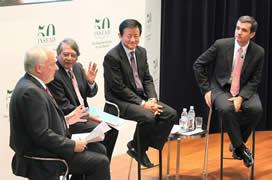
Fan is expecting the free market to play a bigger role in the country’s economy next year, even though the economy currently remains highly reliant on the government’s stimulus measures.
His optimism is underscored by China’s gradual move towards becoming more market-oriented, while enabling greater private ownership or joint ownership of businesses.
Fan says China has learnt from the economic experiences of other countries and has developed its economic and regulatory policies with those lessons in mind.
“You have to recognise that when you are in the early stage of development and (your) institutions are in transition, you have to be cautious about the financial risks if you open too early, premature and (are) not able to handle your system,” says Fan.
When you cannot handle the whole system, “then you get into trouble, that’s what we learned from the Asian (financial) crisis.”
Fan believes China has an adequate regulatory system in place as it managed to avert the subprime contagion experienced in the US and Europe.
“I think as long as we can prevent the big financial crisis and as long as we can prevent the big bubbles, I would say the regulation is really in place.”
“We didn’t experience the big financial meltdown, we didn’t experience the greater depression.”
Fan says China also managed to sidestep the Asian financial crisis of the late 90s because of its tremendous foreign currency reserves, which helped build international confidence in China’s financial stability.
“Basically because we didn’t liberalise the financial market too quickly … before (we were) ready, before all the other institutions are compatible with more liberalisation,” says Fan, pointing to areas such as the legal framework, property rights, the regulatory structure, the maturity of China’s banking sector and the ability to manage foreign exchange risks.
That was a sobering lesson China learnt from other Asian countries that were devastated by the Asian financial crisis. Fan says those countries had received bad advice and had “opened before they were ready.”
Asked whether the Chinese government should have used billions of dollars to bail out the major domestic Chinese banks that were loaded with bad debt, Fan replies that China had effectively acted in the same way Washington did last year to prevent the financial system from melting down.
Fan acknowledges that China’s major banks, controlled by the state for decades, had been loaded with bad loans, which were “a legacy of the old command economy.”
“People didn’t realise if you really want a bank, you have to have banking regulations, you have to be a bank, not a government institution.”
Fan adds that China has since realised the need to reform its banks and has introduced partial privatisation and changes in the banks’ corporate governance.
“This is a history of transition from a planned economy, command economy to a market economy. It’s still not yet a full market economy, but it’s moving in that direction.”
He says the banks are now in a better shape as they are more profit-oriented and risk-averse, while being better regulated.
“Before no one checked. As long as the government said, ‘you should make loans,’ they made the loans. But now people check the loans and people check the risks.”
“Sometimes we even say that maybe we are too cautious, we have too many regulations, we need to liberalise further. I believe that’s what’s going on. When people have better regulations, people will be more confident to allow the banks to do more (in terms of) market competition.”
Asked when he thinks the yuan will become fully convertible, Fan says there are “fundamental” issues to consider. These include China’s ability to control capital inflows and outflows, the maturity of the financial market and the strength of the regulatory framework.
“It’s not only the convertibility issue,” he told INSEAD Knowledge. “It’s about how much risk you are facing when you have this convertibility.”
-
View Comments
-
Leave a Comment




No comments yet.